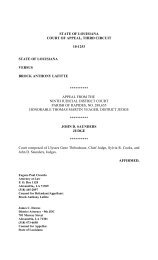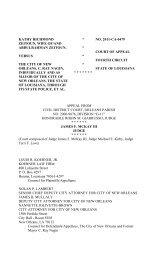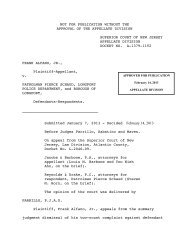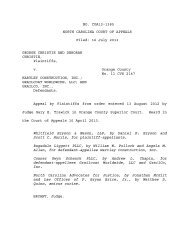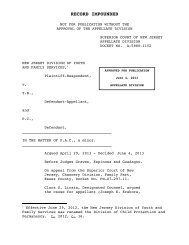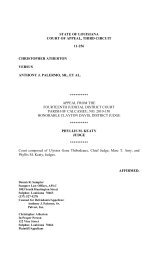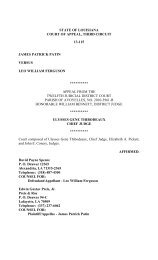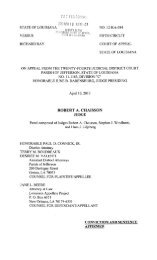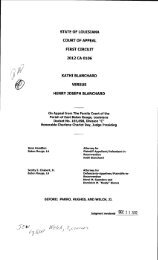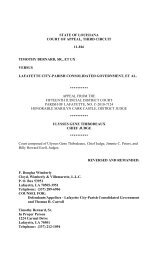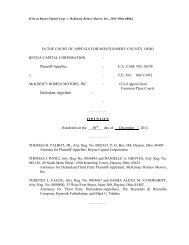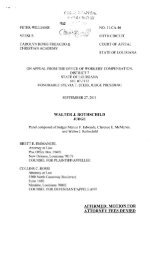Document generated from the Louisiana Court of Appeal, Fourth ...
Document generated from the Louisiana Court of Appeal, Fourth ...
Document generated from the Louisiana Court of Appeal, Fourth ...
You also want an ePaper? Increase the reach of your titles
YUMPU automatically turns print PDFs into web optimized ePapers that Google loves.
for intervening. Less than two months after <strong>the</strong> Contingency Fee Agreement was<br />
executed (on December 18, 2009), Mr. St. Pierre died. Upon his death, <strong>the</strong><br />
Contingency Fee Agreement between him and <strong>the</strong> Roussel Firm automatically<br />
terminated, 10 leaving Ms. Lawyer as <strong>the</strong> sole client. The Roussel Firm has a right<br />
<strong>of</strong> action under La. R.S. 37:218 only against its client, Ms. Lawyer, and <strong>the</strong><br />
settlement funds that Ms. Lawyer might receive, which include only a one-fourth<br />
share <strong>of</strong> <strong>the</strong> survival action damages.<br />
Although <strong>the</strong> Roussel Firm has a right <strong>of</strong> action against Ms. Lawyer, <strong>the</strong><br />
Roussel Firm has no basis at this time to intervene to assert that right <strong>of</strong> action for<br />
two reasons. First, given <strong>the</strong> Roussel Firm‘s status as Ms. Lawyer‘s existing<br />
counsel <strong>of</strong> record, <strong>the</strong> appropriate procedural vehicle for it to assert its rights in this<br />
action as to attorney‘s fees is by filing a motion. See Brown, 11-1576 at p. 4, ___<br />
So.3d at ___ (noting that attorneys who are still engaged in representing parties to<br />
<strong>the</strong> lawsuit appear in <strong>the</strong> suit by filing motions). Second, any claim by <strong>the</strong> Roussel<br />
Firm against Ms. Lawyer for its attorney‘s fees is premature until <strong>the</strong>re is a<br />
settlement or judgment. Cox v. Boggs, 39,566, p. 4 (La. App. 2 Cir. 4/6/05), 899<br />
10 The <strong>Louisiana</strong> Supreme <strong>Court</strong> has held that ―death <strong>of</strong> <strong>the</strong> client itself terminates <strong>the</strong> client-attorney relationship by<br />
operation <strong>of</strong> law; <strong>the</strong>refore, <strong>the</strong>re is no necessity for a rule requiring <strong>the</strong> attorney to withdraw when <strong>the</strong> client dies.‖<br />
Succession <strong>of</strong> Wallace, 574 So.2d 348, 359 (La. 1991) (citing Due v. Due, 342 So.2d 161, 164-65 (La. 1977); and<br />
Kinsey v. Dixon, 467 So.2d 862, 864 (La. App. 2d Cir.1985)). Explaining <strong>the</strong> reason a contingency fee contract<br />
terminates upon <strong>the</strong> client‘s death, <strong>the</strong> Second Circuit in Kinsey, supra, stated:<br />
A contract for legal services is a contract <strong>of</strong> mandate which is terminated by operation <strong>of</strong> law upon<br />
<strong>the</strong> death <strong>of</strong> <strong>the</strong> principal or mandatory. Due v. Due, 342 So.2d 161, 164-5 (La.1977); La. Civil<br />
Code article 3027. The only exception to termination at death is a contract <strong>of</strong> mandate which<br />
constitutes a ―power coupled with an interest.‖ A contingency fee contract is a ―mere interest in<br />
<strong>the</strong> exercise <strong>of</strong> <strong>the</strong> power‖ <strong>of</strong> mandate and is not a power coupled with an interest in <strong>the</strong> property.<br />
Montgomery v. Foreman, 410 So.2d 1160, 1167 (La.App. 3d Cir.1982). Consequently, a<br />
contingency contract terminates at <strong>the</strong> death <strong>of</strong> <strong>the</strong> principal.<br />
467 So.2d at 864.<br />
14



